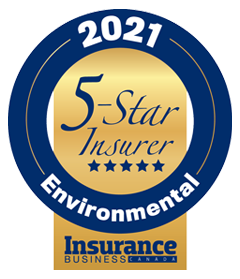
Historical Pollution
5-Star Awards 2021: Environmental Insurance
Historical pollution insurance protects businesses from liabilities associated with environmental pollution events that may have happened in the past.
5-Star Historical Pollution
- Berkley Canada
- Burns & Wilcox
- Chubb
- Totten Insurance Group
- Victor Canada
What does a pollution policy cover?
Pollution liability insurance covers claims brought against your company for pollution of property or that harms people. The cost of the damage award for claims like these can be astronomical, which means buying this type of insurance can protect businesses from bankruptcy or debilitating financial challenges. Typically, the standard coverage options that come with a pollution insurance policy include:
Legal defense fees. In case of a pollution-related lawsuit, insurers would provide a company with specialized attorneys as a defense. The policy may also cover various court costs and legal fees.
Clean-up efforts. Your business would be compensated for some of the costs if you are legally required to clean up contaminants. Most insurance companies would allow you to purchase stop-loss policies limiting the costs to your business in the event of a clean up. This will benefit you if more pollutants are discovered during clean up.
Operations. Companies that use hazardous materials and chemicals should have coverage for oversights and accidents that lead to pollution. The types of coverage here are: catastrophic coverage (sudden events like explosion or fire) and non-catastrophic coverage (pollution over a longer time frame that impacts neighbouring residents/businesses.)
Property transfer. If you purchase a building or a piece of land that has been contaminated or polluted by the past owner, property transfer protects you. Insurers generally cover the clean-up costs if business owners have this type of coverage.
Errors and omissions. Designed for environmental consultants or clean-up companies, this type of coverage covers for liability should they wrongly declare a property absent of pollutants or if their work produces more contamination.
How much does this insurance cost?
Pollution liability insurance policies have a wide price range, depending on the business. If you use hazardous chemics, your premiums will be higher than if you own a business that uses less. There are various factors to account for, including: the type of hazardous materials or chemicals used; the type of business being insured; the proximity of the business to residential neighbourhoods; and how the hazardous waste is disposed. The best way to figure out how much your company will pay for this type of insurance is to review quotes from various insurers. That will help you find a policy that provides the right coverage for a competitive price.
Do you need pollution liability insurance?
Independent contractors may require pollution liability insurance to protect them from damages resulting from hazardous waste materials. It is up to independent contractors to protect themselves from any damages claim caused while working. The businesses that most benefit from pollution liability coverage include agribusiness, oil, excavation, construction, waste depositories, asbestos abatement contractors, and any other company that produces hazardous waste emissions. This type of liability insurance will cover property damage, bodily injury, and clean-up costs resulting from toxic waste contamination. Additionally, you will be covered while you are finishing a job as well as when the job is over.
Does umbrella cover pollution?
There are umbrella policies that do provide coverage for sudden and accidental pollution liability usually omitted from general liability policies. A major factor that should act as a guide when you are searching for a personal umbrella policy is whether or not it covers the ‘gaps’, i.e. the liability risks your business is exposed to that is not covered by your company’s primary policy. If your company works with hazardous waste, for example, that might fall within a ‘gap’ and required added coverage.
What is limited pollution coverage?
Limited pollution liability provides coverage for third-party damages resulting from accidental pollution on your company’s premises or at a work site. It also provides coverage for third-party damages resulting from above-ground pollution at a covered premises; pollution that starts and ends within 72 hours of the policy period; up to full policy limits; defense costs beyond the liability limit; and clean-up costs as part of property damage that is otherwise covered.
What is transportation pollution liability?
Transportation pollution liability, otherwise known as TPL, is pollution insurance for ‘over the road,’ covering those who require protection for possible pollution during transportation. Transportation pollution liability coverage may also include unloading and loading in case your cargo causes pollution.
Transportation pollution liability is crucial since it provides coverage for bodily injury, property damage, defense, spill clean-up, and could also cover you for a chemical or fuel spill from a covered vehicle. There are also various ways to enhance coverage, which includes non-owned disposal sites, contractors pollution liability, pollution coverage for a third-party or common carrier transit, and pollution coverage for your premises. Typically, those who purchase transportation liability insurance include fuel and oil dealers, soil excavation contractors, medical waste haulers, companies in need of commercial vehicle pollution coverage, and emergency response contractors.
Keep up with the latest news and events
Join our mailing list, it’s free!
